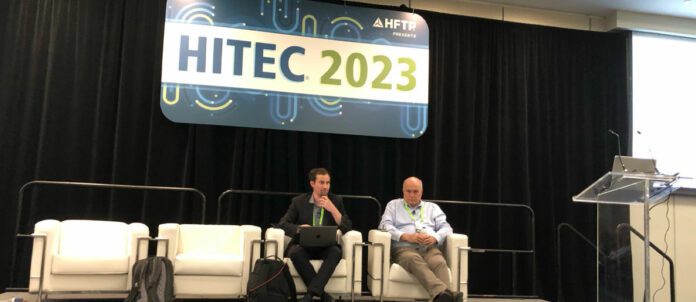By Rosanna Caira and Nicole Di Tomasso
TORONTO — The Hospitality Industry Technology Exposition & Conference (HITEC), produced by Hospitality Financial and Technology Professionals (HFTP), took place recently at the Metro Toronto Convention Centre and brought together more than 6,000 hospitality professionals, executive decision-makers and industry investors from more than 60 countries. HITEC offered more than 50 education sessions on hot topics and trends and showcased more than 320 innovative solution providers.
The Rise of AI-Powered Language Generation
This educational session explored how OpenAi’s ChatGPT (Generative Pre-Trained Transformer), a large language model (LLM) that uses artificial intelligence (AI) to hold text conversations with users, and its competitors are changing hospitality. Moderated by Michael Levie, founding partner of citizenM, the session featured presentations from Tata Crocombe, owner of Aitutaki Lagoon Private Island Resort, The Rarotongan Beach Resort & Lagoonarium and Sanctuary Rarotonga in Cook Islands, and Dr. Joseph Jay Williams, assistant professor at the University of Toronto’s department of Computer Science. First, Crocombe highlighted the benefits of Chat GPT from an operator’s perspective then Williams explained the technology from an academic perspective.
Available to customers worldwide for USD$20/month, Crocombe said “ChatGPT has the potential to impact every single part of the value chain. It can compute ideas and thoughts far more quickly than humans can. It’s as simple as that, and we’re using it in every part of our business.”
Crocombe proceeded to outline the top 10 benefits for hotel operators using ChatGPT, which included enabling a chat bot on hotel websites for pre-stay, onsite and post-stay information; providing an itinerary that incorporates all hotel services; optimizing food-and-beverage operations; recording real time profit and loss, cash flow statements, balance sheets and valuations; automating night audit; optimizing inventory management; accessing staff policies, procedures, training and performance; streamlining recruitment and onboarding; optimizing maintenance scheduling; and optimizing energy-management systems.
Then, Dr. Williams explained LLMs in more detail; highlighted the differences between ChatGPT and GPT; shared examples of what LLMs could say to potential customers or employees; and explored ways to enhance chat bots that have already been deployed.
In simple terms, a LLM is a model that learns to predict text. GPT is a sub-part of an LLM, which involves a particular technique in order to create a LLM. Lastly, ChatGPT is a single chat interface or web app used for interacting with a GPT model.
Dr. Williams continued to identify the ethical considerations when using AI and LLMs. “One issue is LLMs may [obtain private data and it can create legal obligations for data protection and privacy]. Is that going to cause an issue for your business or more broadly? How do you handle that?”
Overall, both presenters agreed ChatGPT will revolutionize the hospitality industry by transforming the way hotels handle customer service and internal operations.
“We are gaining market share on the OTAs with the simple introduction of Chat GPT solutions,” said Crocombe. “We’re going to enhance the experience for guests, as well as the staff, but it’s also going to make things a lot more competitive. I think we’re entering the Golden Age.”
How Workforce Issues are Shaping Today’s Hotel Landscape
The topic of recruitment and retention continues to gain traction across industry circles. Industry consultant Larry Mogelonsky moderated a panel entitled “The Workforce Focus Has Shifted.” The panel featured Neal Patel, past chair of Asian American Hotel Owners Association (AAHOA); Anna Chartres, regional director, Talent & Culture, Central Canada, Fairmont; and Joshua Morgan, director of Technology at the U.S.-based Horizon Properties.
Asked whether technology can solve labour shortages, Morgan said, “Technology shouldn’t be viewed as a means to replace employees. Robots are just a tool, they’re not there to take over our front-desk employees. The intent is always to deliver a great experience, but it’s not a replacement for the human touch.”
In assessing the growth of technology in the hotel space, Patel reminded the audience, “We’re hotel owners, we’re not tech experts.” As such, Patel believes hoteliers are afraid to fail so they don’t want to be the first ones to adapt. But when the pandemic happened and his hotel company was forced to shut down its night shifts, it was forced to test check-in kiosks. “It was connected to an IT member based in India and walked guests through the check-in process,” he said. “It’s not a perfect solution, but there was a void and we found a way to fill the void.” While guest reaction was mixed at first, Patel said through time, guests have come to appreciate the kiosks.
As part of the discussion, Mogelonsky explored the concept of happiness and asked what can be done to make employees happy.
According to Chartres, “We prefer to ask whether an employee is engaged,” adding that the company regularly measures engagement. Among the perks offered by Fairmont to its employees is the option to purchase grocery products four times a year at cost as a means to save on costs and fight inflationary spirals. The panellists also said work-life balance is key. However, Chartres warned that you can’t script the answers to what work-life balance means for everyone. She, and the rest of the panel, believe that flexibility is key to keeping employees engaged. “There’s no-one size fits all approach to flexibility,” said Chartres.
Morgan agreed. “It’s clearly highly individualized. When I was younger, I worked 16 hours a day, but then I got married and had kids and it slowly began to change.” Today, he appreciates having free time to take part in his children’s lives.
Chartres also spoke of the need for women to reach parity at the executive level and stressed that it’s important for women to have their voices heard. While she’s never been passed over for a promotion, Chartres admitted her voice was ignored on many occasions in the past. She believes it’s important for women to speak their minds and let their supervisors know of their need to be seen and heard.
As mental health continues to become more important, Morgan stressed the need for employers to be empathetic. “Be there to support your team through Employee Assistance Program (EAP), and remember that a happier employee is a more productive employee. Everyone is struggling with mental health. You can’t bottle things up.” Chartres added it’s important to be aware of the various resources available.
The panellists agreed it’s important to grow your leaders. “Leaders are not born,” said Patel. “Teach them through your mistakes. Teach them life lessons. Trust and mentorship are very important.”
For more coverage of HITEC, check out the Thursday edition of Hospitality Headlines


















